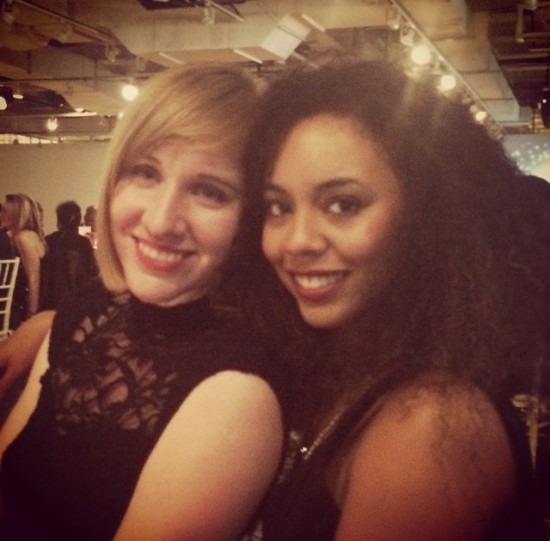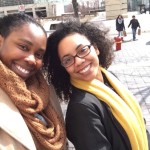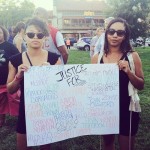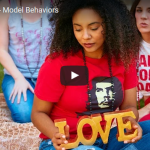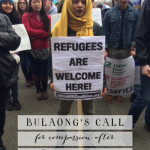Courtney: We’re talking about hair. And we’re talking about race. Two things that might not immediately strike someone as being related. But lately there’s been a lot of discussion about the natural hair movement and white people appropriating black culture. One instance I’m thinking of in particular is when Amandla Stenberg—the actress who portrayed Rue in The Hunger Games—called out Kylie Jenner, who posted a pic of herself with cornrows yet never acknowledges any other aspects of black culture on her profile, in particular movements like #BlackLivesMatter.
On top of the racial implications, hair has long since been a complex source of both power and objectification for women. The way we fashion it or don’t fashion it. If we wear it up or down, curly or straight, covered or uncovered, long or short or completely shaven, or blonde or brunette or redhead. Our hair says things about us, whether we want it to or not.
When the world sees you, Bulaong, what do you want your hair to say?
Bulaong: Oh my hair! We’ve had such an interesting twenty-six years together and the messages I’ve sent with my hair have changed over time. I’ve absolutely fallen in LOVE with my curls over the past year and have immersed myself into that natural hair community to learn more about growing and maintaining healthy hair. I’m a wash-and-go kind of girl, literally meaning that I wash my hair, detangle it in the shower, toss some organic coconut oil or shea moisture product on it, and head out the door. I set a goal to have a year of no heat—no straightening or blow-drying my hair.
I guess if I would describe my hair in one word, it would be “carefree.”

Courtney: Heck yes! To me, when I see your hair, and when you write about it on social media, you come across as powerful and full of confidence.
The past year of my ongoing hair journey has been interesting as well. I’ve always had the “it’ll grow back” mentality when heading into the salon for some crazy new style or color, especially when I felt like I needed a self-esteem boost. I’d be like, “I feel sad. I’m going to chop all my gee-dee hair off.”

The first time I did that, I was seventeen. I chopped it off and dyed my white-gold locks dark brown, almost black. My dad freaked out. He always wanted me to keep it long and not dyed. I didn’t tell anyone what I was going to do. I just went and did it and said fuck it. It was the first time I really understood my deep-seated feelings of, “This hair belongs to me, and no one can tell me what to do with it.” Which sounds dramatic, but my own vehemence surprised me, and I wasn’t going to ignore it.

Fast-forward to last year when my boyfriend at the time mentioned he didn’t like my haircut—not in a mean way—I’d asked for his opinion after all. But those vehement, stubborn feelings came up, and I didn’t know how to deal with them. Now I’m just kind of in this weird place of “I have no idea what I want to do with my hair so I guess I’ll leave it alone for a while.”
Have you ever experienced anything like this, like someone telling you how to style your hair or commenting on it with or without your asking? How did it go for you?
Bulaong: YES! I did something really similar! My last semester of college I wanted a change, something new and fresh that said, “Hello, world! Bulaong is finally here!” So I went to my grandmother, a hairdresser and the only woman ever to do my hair, and I told her to chop it off. I wore a short bob when my hair was straight and was utterly confused about what to do with it when it was curly, so I constantly straightened it until it finally grew back out.

The guy I was dating at the time broke up with me about two weeks after graduation. I told myself he hated my short hair, and my hairstyle had contributed to him not wanting to date me anymore. I thought I looked unattractive because there had been so much value placed on my curly locks and my long hair. I remember when I was in middle school, I had adults in my community tell me they much preferred my hair straight or curly or up or down.
It’s been a constant journey of people feeling like they can assert their opinions about my hair. I grew up caring what people thought, until I didn’t anymore.

Last year after my boyfriend at the time and I broke up, I once again did some hair therapy. Instead of chopping it off, I went a light brown/blonde for the summer. I needed something fresh, something to cheer me up and welcome me into a new chapter in my life. That color has grown out a lot and is almost completely gone. I now associate the lighter color with my period of healing. The color grew out as my heart healed, and now I’m in a place where the last of the color will be cut off during my next trim. With the trim, I’ll continue my journey with a new love and my natural hair color! It’s come full circle.
Courtney: That’s beautiful, Bu!
As I mentioned earlier, I got the idea for us to talk about this because of what happened between Kylie Jenner and Amandla Stenberg. When I brought up this idea to Toni, we both acknowledged that it can be intimidating for non-black people to talk about racial appropriation or assert opinions into a tense, emotional discussion about what is and isn’t okay. I tend to hold back, to listen and take everything in, to only speak up when I feel like the risk of confrontation is low.
I also realize that everyone’s on his or her own journey to awareness and knowledge, especially when it comes to the subversive, systemic racism all around us. If I look at myself even just a year ago, my perspective has shifted so greatly. I know how much I’ve changed. So perhaps I’m not brave enough today, but as long as I keep pushing myself to talk, to learn, to understand, there may come a day when I am confident enough.
In the case of Kylie Jenner, she is so young. I’m not saying that’s an excuse because obviously Amandla Stenberg is young too, but I believe it’s a factor. My inclination is to give Jenner the benefit of the doubt and say she’s not aware enough yet, of her own power and privilege, and of the pain it causes when she’s willing to take up only the fashionable parts of black culture. Because I also agree with Stenberg’s statement, that it’s irresponsible and wrong to display cornrows and say “I woke up like disss” without ever acknowledging the rest of black culture, including the painful parts.
As a black woman, as an academic, as a girl who likes to try crazy new hairstyles, what is your take on this situation? And what is your take on how to go about discussing tough, complicated issues like racial appropriation?
Bulaong: The issue with Kylie and Amandla is an interesting one to talk about…
- Historically, black women haven’t been given the space to “be young” to “be children” as we saw with the Texas Pool Party Incident. Unfortunately, the roots of racism in this country have created a current culture where young black girls are sexualized, abused, & reprimanded publicly (like Amandla was) for just being, let alone having thoughts and opinions. This article really sums it up. In reality young black people haven’t been given the space in America to be free-thinking, critical beings—especially when our thoughts and feelings may seem like an “attack” on the freedom for white people to do as they please. Again, we saw that currently with the Sandra Bland video. Bland, a Black woman who dared to know her rights and dared express anger and emotion about being pulled over was labeled by many people as “insubordinate,” an excuse used to justify her arrest and ultimate death.
- The Kardashian brand as a whole has literally been surrounded with black culture and black people and I have yet to hear one of them speak on #blacklivesmatter or acknowledge their own privilege as it pertains to their ability to move in and out of “blackness” as they see fit. What I mean by this is that where Kylie’s “big lips” and Kim’s large butt have been seen as beautiful, desirable, valuable (literally worth millions), those same attributes have been deemed ugly and undesirable on black women.
Also, I’m having this conversation as a light-skinned, long curly-haired black woman, and there is privilege in that. I’m accessible, approachable, and experience racism/appropriation in very different ways than my darker sisters with less valued hair types.

PS: I was just browsing through my “on this day” on Facebook, and on this day last year, I posted this article: “5 Reasons Natural Hair Should Not Be Viewed as Unprofessional.”
How fitting 🙂
Courtney: Hehe, that is too perfect! And proof that we, as a culture, need to continue talking about hair and race!
One thing I’ve heard on this topic is, “It’s just hair! What’s the big deal?” But to me, this is lazy. Anything related to cultural beauty standards should be examined and examined deeply. The beauty standards imposed upon women are strict and most of the time oppressive, and black women get the extra short end of that oppressive stick.
From what I’ve gathered, part of what’s behind the natural hair movement as a social movement rather than “just” a beauty trend is the fact that because our culture is so dominated by white beauty standards, natural black hair in all its forms is perceived as “other.” So styles like cornrows, locs, and twists, or even just headscarfs, get labeled as “exotic” or “alternative.”
Apart from when I was very young, I went to a school that had two black people the entire time I was there. I was nineteen before I even realized that black hair care was dramatically different than my own. I worked at Sally’s on the East Side in Austin when I was in college. We had a lot of black women come in for product. My first few weeks there were a tremendous learning experience. When a customer asked for the Proclaim olive oil and then had to explain what it was, in my mind I was like “Wuuuut? You put oil in your hair? Like on purpose?” It’s embarrassing to admit I thought olive oil was only for cooking.
When I went to read that article on the Black Girl Long Hair site you linked to above, I kind of fell into an Internet wormhole of reading a bunch of their other posts. I read one where Zoë Kravitz talks about having to “un-brainwash” herself from buying into the prevalent white culture beauty standards. Did you ever experience an awakening like this? If so, what did that look like for you?
Bulaong: You worked at Sally’s (one of my favorite places ever)! Growing up with my grandmother who is a hairdresser was actually really fun. She made sure to instill in me the beauty of my natural hair.

Of course when I was little, braids were really easy, but going to a predominately white school I always envied the white girls with the really, really long straight hair.
That all changed when the Spice Girls blew up! I’d never before seen a beautiful, strong, famous woman of color wearing natural curls and people loving and admiring her. Scary Spice (Mel B) was my idol! I was 10 years old and of course didn’t have the language to analyze what was happening. Looking back, I finally had representation in mainstream media. I would have a bunch of my girlfriends meet at my house every Sunday for our Spice Girls Club where we would pick out of a hat which Spice Girl we would be. I, of course, always cheated so that I could be Scary Spice.
As I transitioned to middle school, Alicia Keys came on the scene, and not only was she a biracial beauty, she was also a trained classical pianist (like me). I started letting my hair grow, putting it in long braids with beads, and got my first AIM screen name “littlemisskeys17.”
The big thing for me was seeing that representation and becoming more and more conscious of the diverse beauty of black/brown women, especially how it pertains to our hair. That we can have afros, braids, locs, weaves, bald heads, curly hair, straight hair, long hair, permed hair, and whatever, yet we are all beautiful.
The hard part is trying to convince everyone else of that when whiteness and attributes associated with white people has been elevated as superior, but that’s the continued work.
Courtney: I’m having a fun time imagining little Bu singing, “If you wanna be my lovuh,” and whipping your curls around, rigging the game, and being generally fierce. I don’t know much about the Spice Girls. I wasn’t allowed to play Spice Girls because my mom didn’t approve of their short skirts and risqué songs.

I read that the girls were given their nicknames by a tabloid, and that Mel B got hers because she was “so loud and had tried to take over [the] whole photo shoot.” Is there a deeper meaning behind that? I feel like her name eventually evolved into something powerful and almost like a warning. Like, “Don’t mess with Scary Spice or you’ll have regrets.” But maybe there’s some underlying social shit there, too?
Bulaong: Oh, I definitely think there is some underlying “stereotypes” with her name. Like, how does being loud and assertive equate to “scary”? Would a loud, assertive white woman ever be labelled that? Being a critical thinker, these questions come up. And most likely, the name came from a place of joking or from someone unconscious of the stereotype that has been assigned to black women. This is why it’s so important to talk to other people. It’s impossible to be aware of potential offensiveness, or what we call in the business of social justice “microaggressions” if you don’t talk with and aren’t challenged by others.
Courtney: Exactly. Allowing ourselves to be open, allowing ourselves to admit and accept that we aren’t perfect and that we don’t know everything, this is how we become better, more knowledgeable humans. Just today I watched a video of author Daniel José Older brilliantly discussing why we should not put foreign languages in italics.
It blew my mind! I rushed to my manuscript, found all the Spanish and French, and un-italicized that shit. We have to question everything. Not only do we have to listen to and take in the experiences of others, but it’s a very real responsibility of the privileged to go out there and look for those stories, to ask for them, to put them in privileged spaces. We can’t wait for them to land on our doorsteps.
I was listening to a podcast the other day between Laura Marling and the drummer in her band, Matt Ingram, who also happens to co-own the studio where she records her albums. First and foremost, I love Laura Marling. Her music is my soul. But in their discussion she talked about being appalled by the world around her, by the hate, the injustice, the inequality, and all the ugliness. She said she’s gotten to a point where she just can’t handle it anymore, so her way of dealing with it is to be weird, to retreat into her music, and to essentially tune it all out. I have to say, I was disappointed to hear this, because in fact, I’ve heard this from a lot of people. Hell, I’ve been guilty of saying it. But I don’t want to go forward like that. When I think that way, what I’m really thinking is, “I prefer to stay in my bubble and ignore the struggle of my fellow humans.” It’s especially easy for me to do this because currently our society caters to me and my bubble—to my blonde hair, my blue eyes, my slender frame, my white skin.
Simply put, this is not okay. I want it to change. I hope it does change.
Any final thoughts on inequality, privilege, the natural hair movement, or beauty standards in general?
Bulaong: I love Daniel José Older! Actually found him on Twitter a few months ago and have been following him since! I think you’ve said it all! It’s so easy for people to stay in their bubbles, to ignore conditions that don’t directly affect them and stories that don’t necessarily impact their lives. I think we all need to do some deep exploration into history and the privileges we’ve been afforded and how that affects people in ways that we aren’t ever intended to know.
I’ve been thinking a lot about money for example. The United States currency is not set up for people who don’t have the privilege of sight. All of our paper money is the same size and so a person without sight would have to trust that no one would be dishonest during an exchange. These are the things we must think about, those of us who have identities that are privileged, those of us who don’t have to think about what other people experience on a day-to-day basis in terms of inequity and discrimination.


